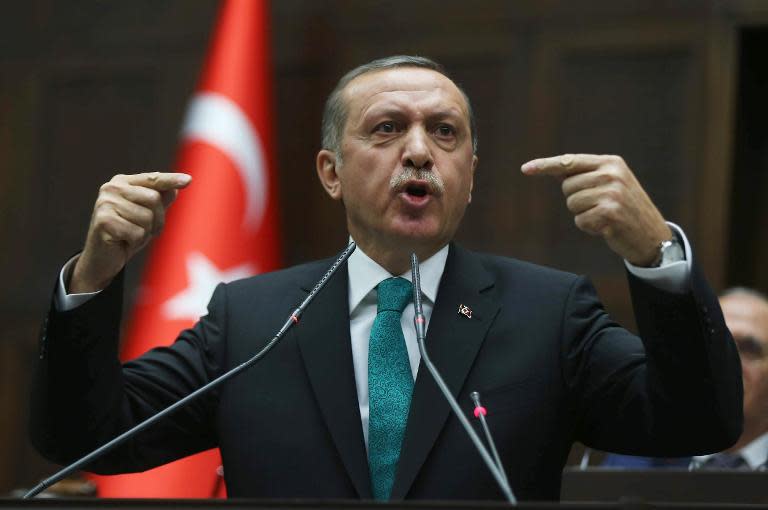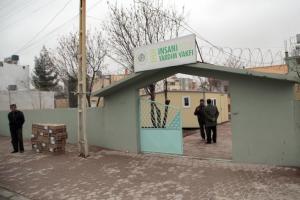
Ankara (AFP) - Turkish Prime Minister Recep Tayyip Erdogan said Tuesday he was ready to withdraw a contentious bill aimed at curbing the powers of the judiciary as he battled to contain the worst crisis of his 11 years in office.
"If you take pity, you’ll become pitiable," the defiant Turkish leader thundered.But he vowed he would show no mercy in the bitter power struggle pitting his beleaguereed government against supporters of an influential exiled cleric.
"Our democracy escaped the largest, heaviest and wickedest coup attempt ever," he told lawmakers from his ruling Justice and Development Party (AKP), referring to a corruption probe launched in December that has targeted his inner circle.
His comments came as the country's political tumult took yet another twist with police raids against an Islamic charity close to the government that is accused of shipping arms to Syrian rebels.
The Humanitarian Relief Foundation (IHH) branded the raids -- part of a wider operation against Al-Qaeda -- a "smear campaign" and indirectly blamed members of the movement headed by influential Turkish cleric Fethullah Gulen, a onetime Erdogan ally.
Erdogan, who once held an almost unassailable grip on power, has been battling on several fronts since police launched the anti-graft raids in December.
His government has sought to limit the powers of the judiciary and purged hundreds of police and prosecutors involved in the investigation, which Erdogan claims is a plot by Gulen supporters to destabilise him ahead of local elections on March 30.
Erdogan offered a compromise in the row over the judiciary, saying he could hold off his legislation if the opposition agreed to consider judicial reforms as part of changes to the consitution.
'Black stain on Turkey's democracy'
Erdogan's comments came a day after President Abdullah Gul -- who has emerged as a more conciliatory figure -- intervened to try to defuse the crisis over the bill, holding talks with several political leaders.
The legislation was regarded by critics as a bid to head off the corruption probe that has seen the detention of dozens of people including business leaders, civil servants and the sons of cabinet ministers.
Erdogan is believed to be seeking the presidency if the constitution is changed to give the post US-style executive powers. But parliamentary efforts at adopting a new charter failed late last year.
Erdogan accuses the so-called Gulenists -- who hold key posts in the police and judiciary -- of deliberately acting as a "state within a state" to topple the government.
On Tuesday, he described the anti-graft operation as a "black stain" on Turkey's democracy and rule of law and an "act of treachery".
And he also accused the Gulen movement of deliberately trying to undermine the Turkish secret service, the National Intelligence Organisation (MIT), and blocking its efforts to deliver aid to Syria.
Media reports said 23 people were arrested in simultaneous raids in six cities on Tuesday against Al-Qaeda suspects accused of sending fighters to Syria, raising money for Syrian rebels under the guise of seeking charitable donations, and providing arms for Al-Qaeda.
The IHH, which hit world headlines after Israeli commandos raided one of its aid ships headed for Gaza in 2010 and killed nine activists, said one of its staff was arrested in the operation, but denied any Qaeda links.
"This smear campaign is backed by people inside and outside Turkey," IHH secretary general Yasar Kutluay told AFP.
Turkish media reported two weeks ago that security forces had stopped a truck loaded with weapons on the Syrian border. The drivers claimed they were carrying aid on behalf of IHH and the group denied the arms allegations.
The Turkish government was an early and vociferous opponent of Syrian President Bashar al-Assad after the conflict erupted in March 2011 but has repeatedly denied it is involved in arming rebels.
However, in December, local media -- quoting UN and government documents -- reported that Turkey had shipped 47 tonnes of arms to the rebels since June.
Meanwhile, the Turkish lira has hit a low of over 3.0 to the euro and the stock exchange has also slid.
"We continue to think the outlook for the Turkish lira remains grim," said Kathleen Brooks, research director at online trading site Forex.com.



No comments:
Post a Comment